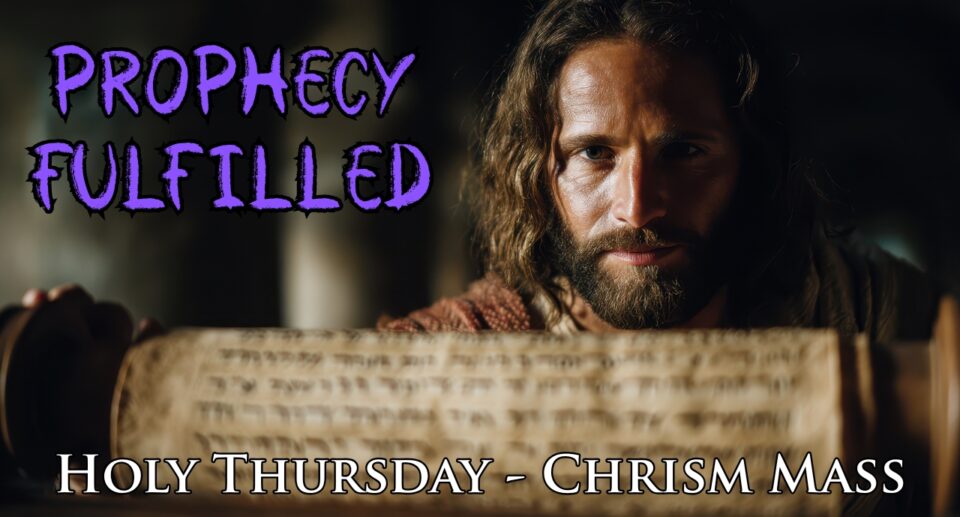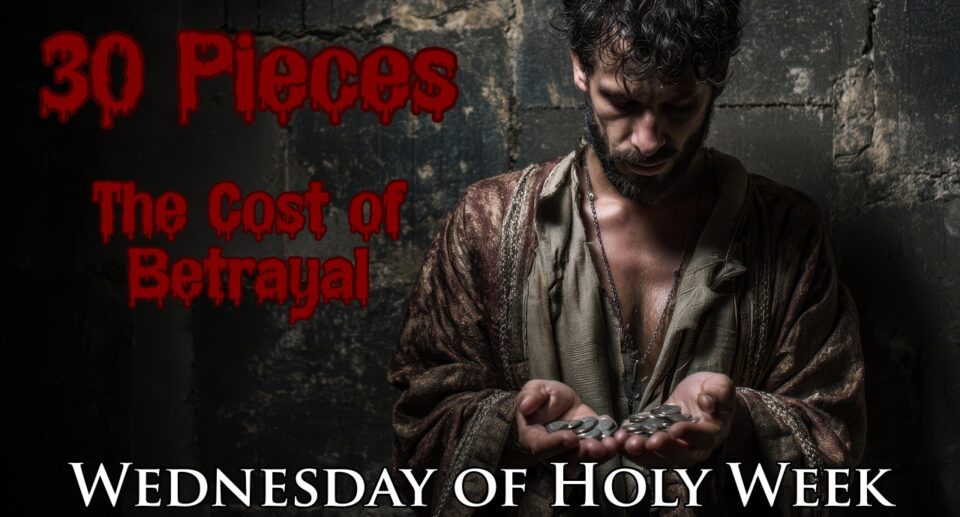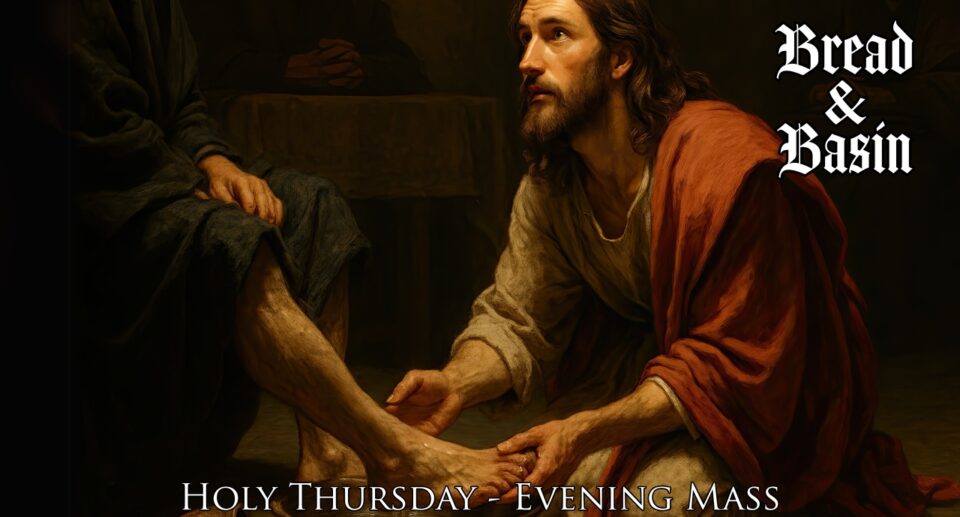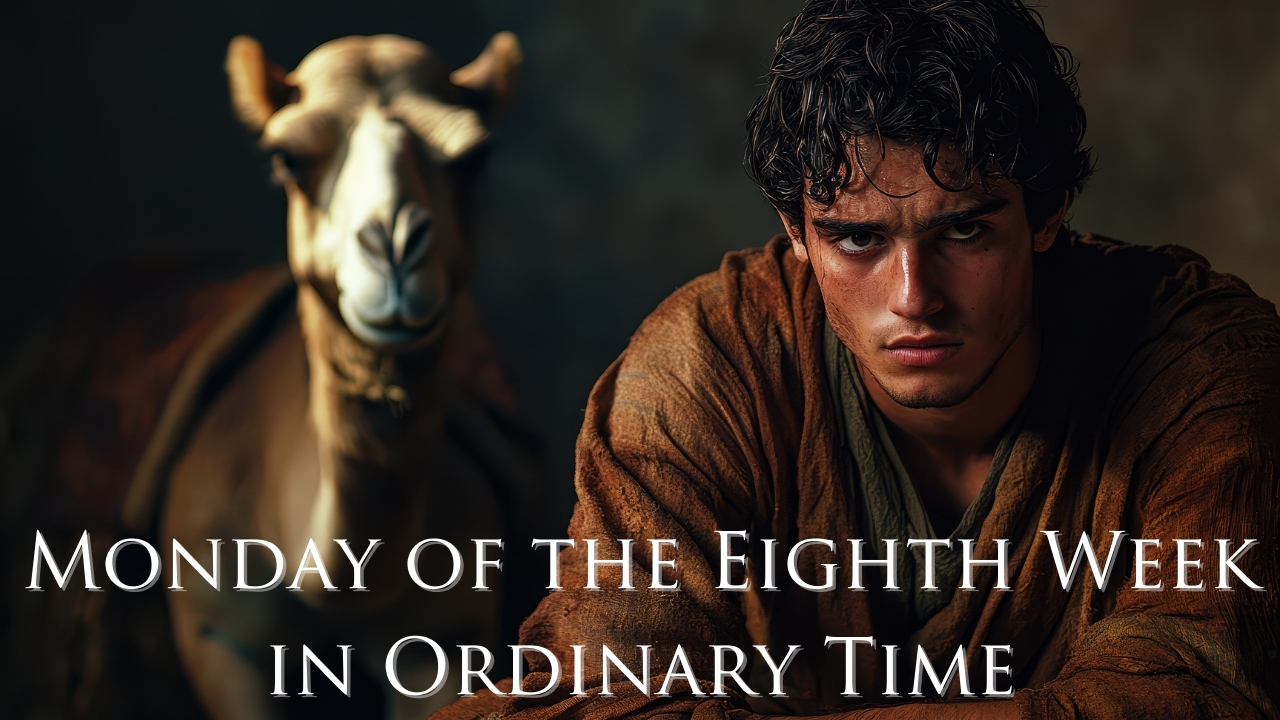Anointed for Purpose: Sacred Oil Meets Divine Mission | Daily Readings | April 17, 2025 | Chrism Mass

Each Holy Thursday, bishops gather with their priests to bless three sacred oils and renew ordination promises. But this ancient ritual is about more than fragrant oil—it’s about divine purpose flowing from Isaiah to Christ to us today.
Through this reflection, you’ll discover:
- The profound connection between anointing and mission in Scripture
- How Christ’s declaration in Nazareth fulfills centuries of prophetic hope
- What it means to be part of a “kingdom of priests” in today’s world
- How the oils blessed today continue Christ’s mission of liberation and healing
Readings covered: Isaiah 61:1-3a, 6a, 8b-9; Psalm 89:21-22, 25, 27; Revelation 1:5-8; Luke 4:16-21
Perfect for priests preparing to renew their promises, liturgical ministers seeking deeper understanding of sacred oils, or any Catholic wanting to appreciate the rich symbolism of the Chrism Mass before entering the Triduum.
#ChristmMass #HolyThursday #SacredOils #AnonitedForMission #PriestlyRenewal #SacredTriduum #CatholicLiturgy
Anointed for Purpose: The Oil that Consecrates and Sends
The scent filled the cathedral—rich, earthy, yet sweet. Ancient and new all at once. As the bishop breathed over the vessel of chrism, something primal stirred in the gathered assembly. Oil. The substance that for millennia has sealed covenants, consecrated kings, healed wounds, and marked those set apart for sacred purpose.
Today, throughout the world, bishops gather with their priests to bless three oils: the Oil of the Sick for healing, the Oil of Catechumens for strengthening, and Sacred Chrism for consecration. In this ritual, ancient as the church itself yet renewed annually, we witness the sacramental heart of our faith—ordinary elements transformed by blessing to become vehicles of extraordinary grace.
But this Mass isn’t just about blessed oil. It’s about anointed purpose. It’s about mission. It’s about the confluence of past promise and present fulfillment that propels us toward future glory. And our readings today capture this powerful current that flows from Isaiah to Christ to us.
In our first reading, Isaiah speaks in the prophetic first person: “The Spirit of the Lord GOD is upon me, because the LORD has anointed me.” This anointing isn’t merely symbolic but purposeful, directed toward specific actions: “He has sent me to bring glad tidings to the lowly, to heal the brokenhearted, to proclaim liberty to the captives and release to the prisoners.”
Isaiah describes a comprehensive mission of liberation and restoration. The anointed one doesn’t just proclaim abstract theology but enacts concrete transformation—bringing good news, healing broken hearts, freeing captives, releasing prisoners, and comforting mourners. This anointing creates a chain reaction of renewal that affects both individuals and communities.
Then Isaiah introduces a stunning expansion: “You yourselves shall be named priests of the LORD, ministers of our God shall you be called.” The anointed one’s mission extends to creating “a kingdom of priests,” a people who collectively embody the mediating, blessing work previously reserved for the select few. This mission creates not isolated holy individuals but a holy community.
The psalm continues this theme, connecting anointing specifically to David: “I have found David, my servant; with my holy oil I have anointed him.” This royal anointing establishes both authority and responsibility. The king isn’t anointed for personal glory but to shepherd the people with skilled hands. God promises, “My faithfulness and my mercy shall be with him,” indicating that the anointed one’s power flows from ongoing relationship with the divine source.
Then our reading from Revelation propels us forward in salvation history: “Jesus Christ… loves us and has freed us from our sins by his blood.” Here the liberating power comes not through oil but through blood—yet the purpose remains the same: freedom, restoration, transformation. And like Isaiah’s prophecy, this liberation creates a community with shared identity and purpose: “He has made us into a kingdom, priests for his God and Father.”
This brings us to the Gospel, where these prophetic threads find their fulfillment. Jesus returns to his hometown synagogue in Nazareth and deliberately selects the Isaiah passage we just heard: “The Spirit of the Lord is upon me, because he has anointed me to bring glad tidings to the poor…”
After reading, Jesus makes an astonishing declaration: “Today this Scripture passage is fulfilled in your hearing.” Not someday. Not in some distant messianic future. Today. Here. Now. In me.
With this simple statement, Jesus identifies himself as the long-awaited Anointed One, the Messiah whose mission encompasses all that Isaiah foretold. The carpenter’s son from Nazareth claims to embody the fulfillment of centuries of prophetic hope.
What does this confluence of readings reveal for us today?
First, these texts remind us that anointing always combines identity with mission. In scripture, no one is ever anointed merely for status or privilege. Anointing always signifies being set apart for service. The oils blessed today will mark people for specific purposes—healing, strengthening, consecrating—continuing this biblical pattern where divine selection leads to human action.
Second, we see how Christ’s anointing flows outward to create an anointed community. Both Isaiah and Revelation describe not just an anointed individual but a kingdom of priests who collectively embody divine purpose. Christ’s unique anointing doesn’t terminate with him but extends to create the Church—a community that continues his mission of bringing good news, healing, liberation, and comfort.
This reality illuminates the deeper significance of today’s Chrism Mass. As priests renew their ordination promises and the bishop blesses oils that will mark the sick, the catechumens, and the newly baptized, we witness the ongoing extension of Christ’s anointing through time and space. What began with Jesus in that Nazareth synagogue continues whenever these oils touch human flesh.
Third, these readings challenge us to recognize the radical nature of the mission we’ve been anointed to continue. Jesus’ inaugural sermon provoked such rage that his neighbors tried to throw him off a cliff. The glad tidings, healing, and liberation he proclaimed threatened established powers and comfortable assumptions.
If our understanding of anointed purpose doesn’t similarly challenge the status quo, perhaps we’ve domesticated the mission. If our vision of the Church as a “kingdom of priests” doesn’t disrupt hierarchical thinking, perhaps we’ve missed its revolutionary nature. If our use of blessed oils has become mere ritual without transformative purpose, perhaps we’ve separated what God has joined together—the sign and the reality it signifies.
The Chrism Mass invites us to reconnect these elements—to recognize that the fragrant oil blessed today carries real power when united with faithful purpose. Each year, we renew not just the oils but our commitment to the mission they represent.
For priests, today’s renewal of ordination promises provides a powerful opportunity to reconnect with the original purpose of their anointing. The priesthood exists not for itself but for the mission articulated in Isaiah and fulfilled in Christ—bringing good news, healing hearts, liberating captives, comforting mourners. When separated from this purpose, the priesthood becomes self-referential and loses its evangelical power.
For all baptized Christians—those anointed with chrism at baptism and confirmation—today reminds us of our shared participation in Christ’s mission. By virtue of these sacraments, we too can say, “The Spirit of the Lord is upon me, because he has anointed me…” We too have been consecrated as part of a “kingdom of priests” with responsibility to mediate God’s presence and blessing to the world.
The Chrism Mass stands at a powerful juncture in Holy Week. After days of intensifying darkness—the betrayal arrangements of Spy Wednesday, the abandoned prayers in Gethsemane still to come, the denials and crucifixion on the horizon—this morning liturgy offers a moment of clarity about purpose. Before we enter the sacred Triduum tonight, we remember why Jesus came, why he embraced the cross, why he founded the Church.
He came to bring glad tidings to the poor. He came to heal the brokenhearted. He came to proclaim liberty to captives. He came to release prisoners. He came to comfort mourners.
And he anointed us—through baptism, confirmation, and for some, ordination—to continue this mission until he comes again in glory.
As the bishop breathes over the chrism today, as priests renew their promises, as the oils are carried back to parishes throughout the diocese, may we all reconnect with the purpose that flows from our anointing. May we recognize anew that we have been marked not merely for our own salvation but for active participation in God’s ongoing work of liberation and restoration.
The scent of oil will fade from the cathedral in hours. But the reality it signifies—our consecration for mission—remains. Today, this Scripture passage continues to be fulfilled in our hearing. And more importantly, through our living.






